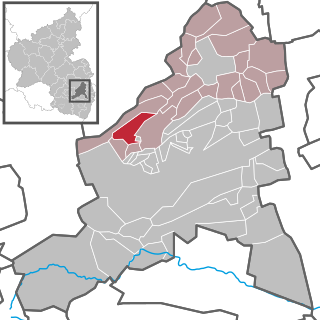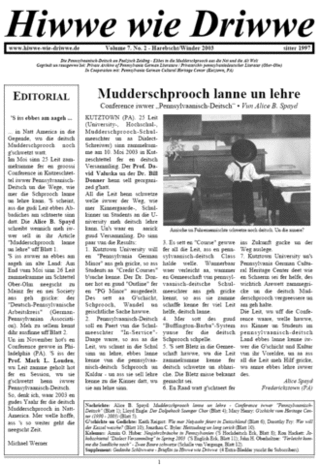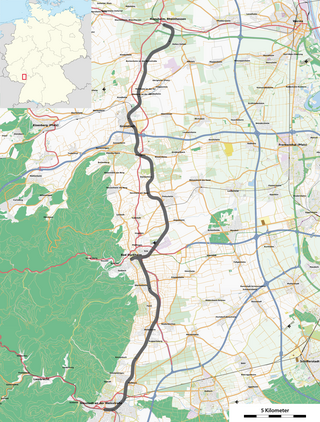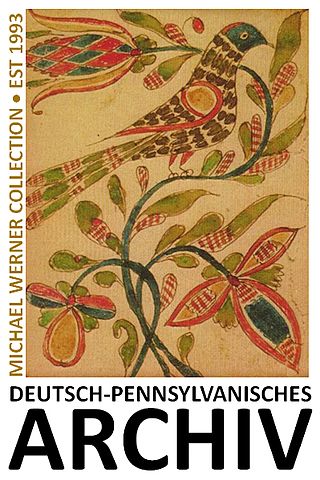
The Palatinate, or the Rhenish Palatinate (Rheinpfalz), is a historical region of Germany. Prior to World War II, it was also referred to as Rhenish Bavaria; as a state of the Holy Roman Empire, it was known as the Lower Palatinate (Unterpfalz), which designated only the western part of the Electorate of the Palatinate, as opposed to the Upper Palatinate (Oberpfalz). It occupies roughly the southernmost quarter of the German federal state of Rhineland-Palatinate (Rheinland-Pfalz), covering an area of 2,105 square miles (5,450 km2) with about 1.4 million inhabitants. Its residents are known as Palatines (Pfälzer).

The Pennsylvania Dutch, also commonly referred to as Pennsylvania Germans, are an ethnic group in Pennsylvania and other American states. They largely descend from the Palatinate region of Germany, and settled in Pennsylvania during the 17th, 18th, and 19th centuries. While most were from the Palatinate region of Germany, a lesser number were from other German-speaking areas of Germany and Europe, including Baden-Württemberg, Hesse, Saxony, and Rhineland in Germany, the Netherlands, Switzerland, and the Alsace-Lorraine region of France.

Pennsylvania Dutch, sometimes referred to as Pennsylvania German, is a variety of Palatine German, also known as Palatinate German or Palatine Dutch, spoken by the Pennsylvania Dutch, including the Amish, Mennonites, Fancy Dutch, and other descendants of German immigrants in the United States and Canada. There are approximately 300,000 native speakers of Pennsylvania Dutch in the United States and Canada.

Ingelheim, officially Ingelheim am Rhein, is a town in the Mainz-Bingen district in the Rhineland-Palatinate state of Germany. The town sprawls along the Rhine's left bank. It has been Mainz-Bingen's district seat since 1996.

The Pennsylvania Dutch Country, or Dutchland, is a Pennsylvania Dutch cultural region spanning the Delaware Valley and South Central and Northeastern regions of Pennsylvania.

Frankenthal (Pfalz) (Palatine German: Frongedahl) is a town in southwestern Germany, in the state of Rhineland-Palatinate.

The Fancy Dutch are the Pennsylvania Dutch who do not belong to the Plain Dutch Anabaptist churches. Unlike the Amish, the conservative Dunkards, or Old Order Mennonites, they do not wear plain clothing, and they fight in wars. Many popularly associated characteristics of Pennsylvania Dutch culture, including spielwerk, hex signs, and other aspects of Pennsylvania Dutch art, music, and folklore, are derived from the Fancy Dutch. The tourism industry and mainstream media often erroneously attribute such contributions to the more conservative Plain Dutch, though they would reject these aspects of their more worldly Fancy counterparts.

The German-Pennsylvanian Association is an organization founded in 2003 in the Rheinhessen area of Ober-Olm in Germany, and dedicated to cultural exchange and research involving the Pennsylvania Dutch language and people. The registered seat of the organization is in the Rhineland-Palatinate capital of Mainz.

Palatines are the citizens and princes of the Palatinates of the Holy Roman Empire, controlled directly by the Holy Roman Emperor. After the fall of the Holy Roman Empire in 1806, the Palatine nationality came to refer specifically to people of the Rhenish Palatinate, known simply as "the Palatinate".

Ebertsheim is an Ortsgemeinde – a municipality belonging to a Verbandsgemeinde, a kind of collective municipality – in the Bad Dürkheim district in Rhineland-Palatinate, Germany.

Carlsberg is an Ortsgemeinde – a municipality belonging to a Verbandsgemeinde, a kind of collective municipality – in the Bad Dürkheim district in Rhineland-Palatinate, Germany.

Ober-Olm is an Ortsgemeinde – a municipality belonging to a Verbandsgemeinde, a kind of collective municipality – in the Mainz-Bingen district in Rhineland-Palatinate, Germany.

A Fersommling is a Pennsylvania Dutch social event in which food is served, speeches are made, and one or more g'spiel, which are plays or skits, are performed for entertainment. "A high degree of theatricality and ceremony is involved, especially in the groundhog lodges: pledging loyalty to the lodge and the groundhog, listening to a weather report, singing patriotic songs in Deitsch, and ending every meeting by asking God to allow them to keep their way of life and their merriment." as described by William W. Donner.

The County of Sponheim was an independent territory in the Holy Roman Empire that lasted from the 11th century until the early 19th century. The name comes from the municipality of Sponheim, where the counts had their original residence.

Hiwwe wie Driwwe, which means "Hither like thither", is the title of the only existing Pennsylvania German-language newspaper.
The Palatine Northern Railways Company – abbreviated to Palatine Northern Railway - was founded on 17 April 1866 as the last of the three major private railway companies in the Bavarian province of the Palatinate.

The Palatine Northern Railway is a non-electrified single-track main line that connects Neustadt (Weinstr) Hbf with Monsheim in the German state of Rhineland-Palatinate. It was opened between 1865 and 1873 in three stages. With the replacement of the old Ludwigshafen terminus with the modern Ludwigshafen Hauptbahnhof through station in 1969, Bad Dürkheim station became the only station in the form of a terminus in the Palatinate region. Passenger services over the Grünstadt–Monsheim section were discontinued in 1984, but re-established in 1995.

Neustadt (Weinstr) Hauptbahnhof – called Neustadt a/d. Haardt until 1935 and from 1945 until 1950 – is the central station of in the city of Neustadt in the German state of Rhineland-Palatinate. In addition to the Hauptbahnhof, Rhine-Neckar S-Bahn services stop at Neustadt (Weinstr) Böbig halt (Haltepunkt). Mußbach station and Neustadt (Weinstr) halt, opened on 19 November 2013, are also located in Neustadt.
German American journalism includes newspapers, magazines, and the newer media, with coverage of the reporters, editors, commentators, producers and other key personnel. The German Americans were thoroughly assimilated by the 1920s, and German language publications one by one closed down for lack of readers.

The German-Pennsylvanian Archive is a collection of books, manuscripts, audio files, etc. about the Pennsylvania German language and culture. The archive is located in the Palatinate, Germany. It was founded in 1993 in Ludwigshafen am Rhein by Michael Werner, publisher of the Pennsylvania German newspaper Hiwwe wie Driwwe. It was moved to Ebertsheim in 1996 and to Ober-Olm in 2000. The archive is a member of the German-Pennsylvanian Association in Germany. In 2017, the German-Pennsylvanian Archive was donated to the "Mennonite Research Center" at Weierhof, Palatinate (Germany). Actually, the archive consists of about 1,500 books and more than 16,000 texts of Pennsylvania German prose and poetry. Additionally, the archive holds a collection of about 800 Pennsylvania German groundhog lodge stories. At the new location, the collection will be available to the public.

















